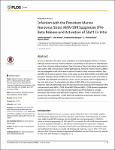Infection with the Persistent Murine Norovirus Strain MNV-S99 Suppresses IFN-Beta Release and Activation of Stat1 In Vitro
Niendorf, Sandra
Klemm, Uwe
Marques, Andreas Mas
Bock, Thomas
Höhne, Marina
Norovirus infection is the main cause of epidemic non-bacterial gastroenteritis in humans. Although human norovirus (HuNoV) infection is self-limiting, it can persist for extended periods of time in immune deficient patients. Due to the lack of robust cell culture and small animal systems, little is known about HuNoV pathogenicity. However, murine norovirus (MNV) can be propagated in cell culture and is used as a model to study norovirus infection. Several MNV are known to persist in mice. In this study, we show that the MNV strain MNV-S99 persists in wild type inbred (C57BL/6J) mice over a period of at least 5 weeks post infection. Viral RNA was detectable in the jejunum, ileum, cecum, and colon, with the highest titers in the colon and cecum. To characterize the effect of MNV-S99 on the innate immune response, Stat1 phosphorylation and IFN-β production were analyzed and compared to the non-persistent strain MNV-1.CW3. While MNV-S99 and MNV-1.CW3 showed comparable growth characteristics in vitro, Stat1 phosphorylation and IFN-β release is strongly decreased after infection with MNV-S99 compared to MNV-1.CW3. In conclusion, our results show that unlike MNV-1.CW3, MNV-S99 establishes a persistent infection in mice, possibly due to interfering with the innate immune response.
No license information

